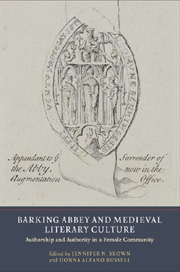Book contents
- Frontmatter
- Contents
- List of Contributors
- Acknowledgements
- List of Abbreviations
- Dedication
- Introduction: Barking's Lives, the Abbey and its Abbesses
- I BARKING ABBEY AND ITS ANGLO-SAXON CONTEXT
- II BARKING ABBEY AND ITS ANGLO-NORMAN CONTEXT
- 5 ‘Sun num n'i vult dire a ore’: Identity Matters at Barking Abbey
- 6 ‘Ce qu'ens li trovat, eut en sei’: On the Equal Chastity of Queen Edith and King Edward in the Nun of Barking's La Vie d'Edouard le confesseur
- 7 Body, Gender and Nation in the Lives of Edward the Confessor
- 8 Clemence and Catherine: The Life of St Catherine in its Norman and Anglo-Norman Context
- 9 Cicero, Aelred and Guernes: The Politics of Love in Clemence of Barking's Catherine
- 10 The Authority of Diversity: Communal Patronage in Le Gracial
- III BARKING ABBEY AND THE LATER MIDDLE AGES
- Afterword. Barking and the Historiography of Female Community
- Bibliography
- Index
- YORK MEDIEVAL PRESS: PUBLICATIONS
8 - Clemence and Catherine: The Life of St Catherine in its Norman and Anglo-Norman Context
from II - BARKING ABBEY AND ITS ANGLO-NORMAN CONTEXT
Published online by Cambridge University Press: 05 April 2013
- Frontmatter
- Contents
- List of Contributors
- Acknowledgements
- List of Abbreviations
- Dedication
- Introduction: Barking's Lives, the Abbey and its Abbesses
- I BARKING ABBEY AND ITS ANGLO-SAXON CONTEXT
- II BARKING ABBEY AND ITS ANGLO-NORMAN CONTEXT
- 5 ‘Sun num n'i vult dire a ore’: Identity Matters at Barking Abbey
- 6 ‘Ce qu'ens li trovat, eut en sei’: On the Equal Chastity of Queen Edith and King Edward in the Nun of Barking's La Vie d'Edouard le confesseur
- 7 Body, Gender and Nation in the Lives of Edward the Confessor
- 8 Clemence and Catherine: The Life of St Catherine in its Norman and Anglo-Norman Context
- 9 Cicero, Aelred and Guernes: The Politics of Love in Clemence of Barking's Catherine
- 10 The Authority of Diversity: Communal Patronage in Le Gracial
- III BARKING ABBEY AND THE LATER MIDDLE AGES
- Afterword. Barking and the Historiography of Female Community
- Bibliography
- Index
- YORK MEDIEVAL PRESS: PUBLICATIONS
Summary
Some time between 1173 and 1199, Clemence, a nun of Barking Abbey in Essex, England, took up the work of translating the Life of St Catherine of Alexandria into the Anglo-Norman vernacular, also known as the French of England. Her source is a Latin text, the Vulgata, composed in the mid-eleventh century. She is true to this source as to the organization of events and the events themselves, but inserts her own voice, speaking through her heroine to weave her own views into the work, making it far more than a mere translation. It is curious, however, that she chose this life of a North African saint, so alien to her chilly island home in the north that had its own abundance of illustrious saints, several of whom were former abbesses of Clemence's own abbey of Barking. One reason may be that in Britain Catherine is associated with women from quite early, particularly with elite matrons, who are encouraged, in the vita, to follow the example of the virgin Catherine. Another reason may be the value of Catherine's example for female religious, especially as an icon of women's scholarship. Her association with theology would have had great appeal for the learned Clemence. In this chapter, I explore another possible motivation behind her choice of material: that this vita provided her with the opportunity to participate in the political and religious discourse of her day. Jocelyn Wogan-Browne and Glyn S. Burgess point out that ‘the Latin legend implicitly configures virgins, matrons and clerical men in an allegiance against secular power’.
- Type
- Chapter
- Information
- Barking Abbey and Medieval Literary CultureAuthorship and Authority in a Female Community, pp. 164 - 182Publisher: Boydell & BrewerPrint publication year: 2012



